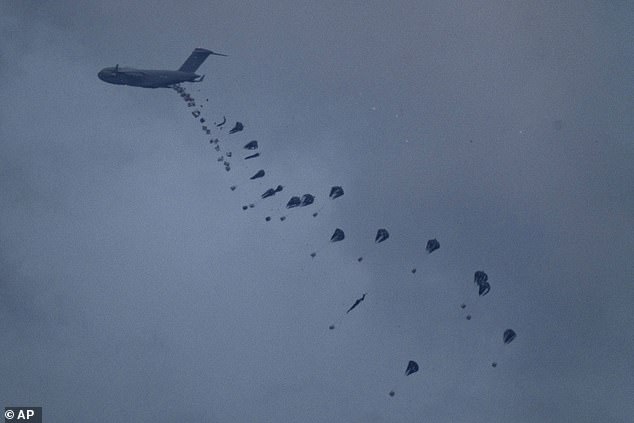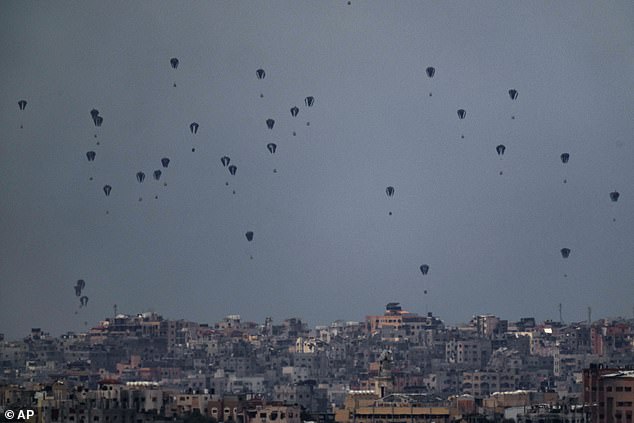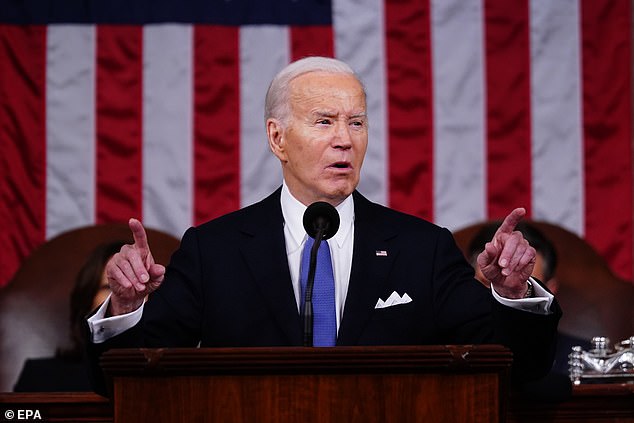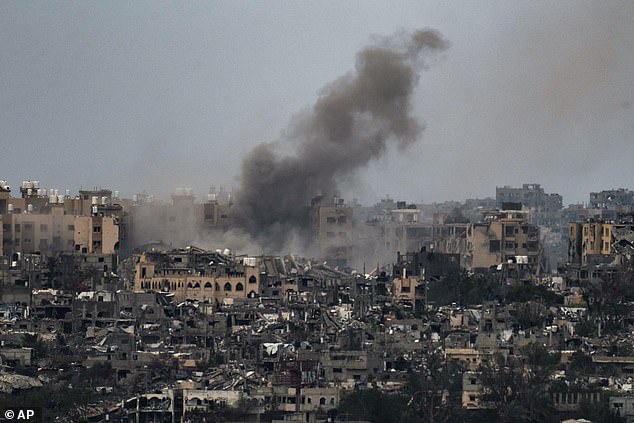Britain will join US and other allies to create maritime corridor to deliver aid directly to Gaza, says David Cameron
The UK will join the United States and other allies to create a maritime corridor to deliver aid directly to Gaza, Lord David Cameron has said.
The British Foreign Secretary made the announcement after US President Joe Biden said in his State of the Union address that he is ordering his country’s troops to build a port on the Gaza coast to provide aid to the population over there.
The move follows growing concerns over the level of aid reaching Gaza through its land borders, with international agencies warning of a threat of famine if current restrictions imposed by Israel on the territory continue.
Lord Cameron said Britain would work with the US to provide assistance by sea.
“People in Gaza are in desperate humanitarian need,” Cameron said in a message on X (formerly Twitter) this morning, following Biden’s speech last night.
The UK will join the United States and other allies to create a maritime corridor to deliver aid directly to Gaza, Lord David Cameron has said.
“Together with the US, Britain and partners have announced that we will open a maritime corridor to deliver aid directly to Gaza,” he added.
Cameron also urged Israel to allow “more trucks into Gaza as the fastest way to get aid to those who need it,” amid the country’s ongoing offensive on the coastal strip, launched in response to the attack by the Hamas terror group on October 7.
His comments came after Biden announced that the US would build a temporary wharf on Gaza’s coastline to allow for the large-scale delivery of aid.
‘Nearly another two million Palestinians bombed or displaced, homes destroyed, neighborhoods in ruins, cities in ruins, families without food, water and medicine. It’s heartbreaking,” Biden told Congress on Thursday evening.
“Tonight, I am directing the US military to lead an emergency mission to build a temporary pier in the Mediterranean Sea on the coast of Gaza where large ships carrying food, water, medicine and temporary shelter can be received,” he said.
Following Cameron’s comments on Friday, EU President Ursula Von Der Leyen said a humanitarian catastrophe is unfolding in Gaza.
She said a pilot of food aid collected by a charity group and supported by the United Arab Emirates could leave Cyprus from Larnaca port in Cyprus as early as Friday.
British aid packages have previously been air-dropped into Gaza in a joint operation with the Jordanian army, and the government has continued to work to find alternative routes to reach the area.
The British government has also called for a “humanitarian pause” in the fighting to allow aid to enter Gaza and hostages held by Hamas to be released.
Last week, the Commons International Development Committee warned that a famine in Gaza would be inevitable without changes to ensure more aid enters the region, which was home to 2.4 million people before the war.
The cross-party committee said a ceasefire of less than 30 days would not be enough to get enough food into Gaza, while US Vice President Kamala Harris has suggested a six-week ceasefire is within reach is.

The move follows growing concerns over the level of aid reaching Gaza by land, with international agencies warning of a threat of famine if current border restrictions imposed by Israel on the area continue. Pictured: Aid is dropped in Gaza, March 8

Parachutes drop supplies in the northern Gaza Strip, seen from southern Israel, Friday, March 8, 2024
After months of warnings about the risk of famine due to Israel’s bombings, offensives and sieges, reports say children are starting to die.
At least 20 people have died from malnutrition and dehydration in the Kamal Adwan and Shifa hospitals in northern Gaza, according to the Hamas-run Health Ministry.
Most of the dead are children, including children aged 15 and a man aged 72.
Particularly vulnerable children are also beginning to succumb in the south, where reports say access to help is more regular.
Sixteen premature babies have died from malnutrition-related causes at the Emirati hospital in Rafah in the past five weeks, one of its senior doctors told The Associated Press.
“The child deaths we feared are here,” Adele Khodr, UNICEF’s Middle East chief, said in a statement earlier this week.
Malnutrition generally leads slowly to death; children and the elderly are affected first, but other factors may also play a role.
Malnourished mothers have difficulty breastfeeding their children.
Israel largely cut off access to food, water, medicine and other supplies after launching its assault on Gaza following Hamas’ Oct. 7 attack on southern Israel – allowing only a trickle of aid trucks to pass through two border crossings in the south.
Israel has blamed UN agencies for growing hunger in Gaza, saying they are failing to distribute supplies piling up at Gaza border crossings.
UNRWA, the largest U.N. agency in Gaza, says Israel is restricting certain goods and imposing burdensome inspections that delay entry.
Distribution within Gaza has also been paralyzed.

The British Foreign Secretary made the announcement after US President Joe Biden said in his State of the Union address (pictured last night) that he is ordering his country’s troops to build a port on the Gaza coast to to provide assistance to the population there.
UN officials say convoys are regularly turned back by Israeli forces, the army often refuses safe passage during fighting, and aid is snatched from trucks by hungry Palestinians en route to drop-off points.
As alarm grows, Israel is bucking U.S. and international pressure, saying this week it will open border crossings for aid directly into northern Gaza and allow sea shipments.
Conditions in the north, which has been largely under Israeli control for months, have become desperate. Entire districts of Gaza City and surrounding areas have been reduced to rubble by Israeli forces. Yet hundreds of thousands of Palestinians remain.
Meat, milk, vegetables and fruit are virtually impossible to find, according to several residents who spoke to the AP. The few items in the shops are random and sold at extremely high prices – mainly nuts, snacks and spices. People have been taking barrels of chocolate from bakeries and selling small smears of it.
Most people eat a weed that grows in vacant lots known as ‘khubaiza’.
UNRWA says Israeli authorities have not allowed deliveries to the north since January 23.
The World Food Organization, which had halted deliveries over security concerns, said the military had forced its first northbound convoy in two weeks to return on Tuesday.
When the Israeli army organized a food delivery to Gaza City last week, troops guarding the convoy opened fire – on a perceived threat, the army says – as thousands of hungry Palestinians stormed the trucks.
About 120 people died in the shooting, but also from being trampled.
The Israeli military said on Friday that its initial investigation into the incident found that troops fired “precisely” at approaching suspects.
World leaders had called for an investigation into the incident on February 29, when the health ministry in the Hamas-run Gaza Strip said Israeli forces opened fire on people searching for food from a truck convoy.
The Israeli military said at the time that a “stampede” occurred as thousands of people surrounded the convoy.
The military released its initial findings on Friday, saying in a statement that the command review found that “troops did not fire at the humanitarian convoy.”

Smoke rises to the sky after an explosion in the Gaza Strip, seen from southern Israel, Friday, March 8, 2024
However, it added that they “did fire at a number of suspects who approached nearby forces and posed a threat to them.”
Witnesses said thousands of people rushed to aid trucks in Gaza City, and that soldiers “fired into the crowd as people got too close to the tanks.”
A UN team that visited Al-Shifa Hospital in Gaza City the following day reported seeing “a large number of gunshot wounds” among dozens of Palestinian patients.
Meanwhile, fresh food supplies in the southern city of Rafah have dwindled as its population has grown to more than a million, with residents displaced. The main thing available is canned goods, which are often found in relief packs.
